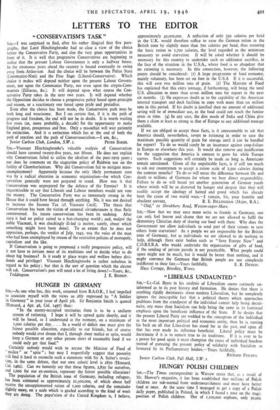Sia,—Viscount Hinchingbrooke's valuable analysis of Conservatism should have covered twenty-five
years, not fifteen. He does not explain why Conservatism failed to utilise the idealism of the post-1919 years ; nor does he comment on the stagnation policy of Baldwin nor on the futility of Chamberlainism. Why did Conservatism fail to mitigate mass- unemployment? Apparently because the only likely permanent cure was by a radical alteration in economic organisation—for which Con- servatives generally were not prepared to stand. How was it that Conservatism was unprepared for the defence of the Empire? It is impermissible to say that Liberals and Labour members would not vote the money. The Conservative Party was so immensely strong in the House that it could have forced through anything. No, it was not desired to increase the Income Tax (cf. Viscount Cecil). The thesis that Conservatism has been the victim of external circumstances is thus flatly
controverted. Its innate conservatism has been its undoing. After 1919 it had no policy suited to a fast-changing world ; and, malgre the noble Viscount, it was shockingly ill-led (a matter, surely, about which something might have been done). To an extent that he does not appreciate, perhaps, the verdict of July, 1945, was the voice of the man who had been unemployed by reason of the restrictive policies of monopoly, capitalism and the like.
If Conservatism is going to propound a really progressive policy, will it not have to jettison most of its traditions and to decide what to do about big business? Is it ready to place wages and welfare before divi- dends and privilege? Viscount Hinchingbrooke is rather nebulous in regard to his policy ; but that is the sort of question which the elector will ask. Conservatism's past will need a lot of living down!—Yours, &c..






























 Previous page
Previous page